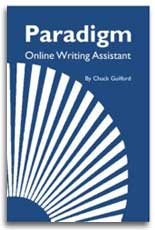Start Writing
There is no single best way to begin a writing project. What's best is what gets you going and builds momentum for the journey ahead. You may want to start right in on a draft or do some pre-planning.
Often, simply Choosing a Subject can be a challenge. You could start Freewriting to locate your subject and generate ideas. Or you might prefer to first gather information from Outside Sources, or to brainstorm using The Journalists' Questions.
Whether you're writing an informal essay, a technical report, or the next great American novel, the suggestions in Discovering What to Write will help you get going.
Write Strong Sentences
Effective sentences are vital to your writing. They are fundamental carriers and shapers of meaning—the pulse of style. If you want to work on your sentences, try the following Paradigm sections: Basic Sentence Concepts, Expanding the Basic Pattern, Six Problem Areas, Designing Effective Sentences.
For help with punctuation, try Basic Punctuation.
Analysis and Synthesis
Analysis refers to dividing a whole into parts. Synthesis refers to the process of constructing a whole from an assortment of pieces.
Read more ...Basic Punctuation
Punctuation need not be mysterious or problematic. The number of punctuation marks is small, and once mastered, they become tools that help shape your meaning and vary the rhythms and patterns of your sentences.
Commas, periods, and apostrophes are three basic marks you can't get along without. Quotation marks, also, are often necessary. First master those four, then move on to the others.
Read more ...Developing Your Style
Everyone has an individual style, not only professional writers. We all—the Hell's Angel in denim and leathers, the banker in pinstripes and bifocals—reveal our personalities and values in our appearance, in our possessions, and in our language.
Read more ...Constructing a Montage
A quilt maker looks at scraps of cast-off fabric strewn about the attic floor and sees a design. Something—some juxtaposition of red beside lavender, some connection of past and present, facts and memories—triggers an impulse, starts an intuitive process. The quilt is both many and one—many individual pieces and one single object.
Read more ...Immersion and Interaction
At the start, you need to get authentically and personally involved with your subject. You need to get inside the subject and get the subject inside of you. Let go of preconceived notions about proper or expected ways to respond. Instead, connect the subject with your own world of experience and understanding. Identify issues you care about.
Read more ...Expanding Your Argument
For now, don't worry about your essay's final structure, but consider expanding and developing the points listed on your Pro and Con Chart. Think in terms of paragraphs, and consider developing each point as though you planned to build a paragraph around it.
Read more ...Revising your Thesis
One major purpose of the thesis is to predict what will follow. It does this for both writer and reader. It provides the writer with purpose and direction throughout the composing process. For the reader it creates expectations about the form and content of what's to come, and the reader's satisfaction with the final essay will depend largely upon whether these expectations have been satisfied.
Read more ...

